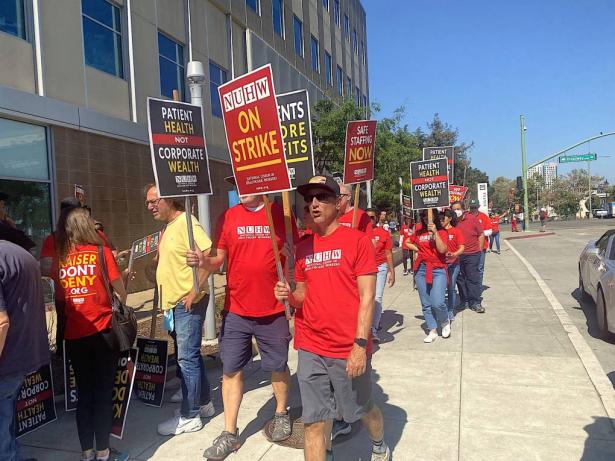Thousands of Northern California Kaiser Permanente mental health clinicians, members of the National Union of Healthcare Workers (NUHW), are on strike.
Their goal is to compel Kaiser to put an end to the gaping disparity in the care it provides for physical vs. mental health conditions.
Patients are forced to wait months before they can start therapy. The union reports that psychologists, therapists, and social workers are quitting in frustration.
Kaiser has been fined by state regulators and sued by local prosecutors for its lack of mental health care. It is now facing a new state investigation following a sharp rise in patient complaints last year.
Kaiser also has failed to comply with a new state law requiring follow-up mental health therapy appointments be provided within 10 business days.
The clinicians have filed whistleblower complaints, pushed for stronger laws, and gone on short-term strikes. But now, after a year of contract negotiations in which Kaiser has rejected proposals aimed at increasing staffing and improving access to care, they’re on their first ever open-ended strike.
A LAST RESORT
Picketing began early Monday morning in Fresno, Sacramento, and San Jose—temperatures there were predicted to reach triple digits by the afternoon. There are also pickets in San Francisco.
"We understand that striking is really a last resort but at this point, we’ve tried everything and the status quo is just unacceptable to continue to go on,” says Sarah Soroken, a triage therapist who works at Kaiser in Napa and Solano counties.
“Patients are suffering. They’re not getting better; they’re getting worse. Some are experiencing worsened prognoses or suicide attempts. Therapists are being forced to practice their trade in a way that violates their profession’s code of ethics and state and federal mental health parity laws.”
The 16,000-member NUHW represents 4,000 Kaiser mental health technicians and clinicians (psychologists, social workers, psychiatric nurses and chemical dependency counselors), including another 2,000 in southern California who reached a contract settlement earlier in the year.
There have been half a dozen strikes at Kaiser in the past decade as mental health care workers have fought to make it possible to treat patients with the attention and treatments they deserve (and pay for).
Few could deny that this country is experiencing a deep crisis in mental health—depression, addiction, suicide—made worse by Covid, gun massacres, a political malaise, impending climate crisis, and the spectacle of never-ending war.
“We’re not willing to be part of a system that disrespects the work we do and prevents us from providing ethical care,” said psychologist Shay Loftus. “Kaiser has no excuse to continue treating mental health care as a separate and unequal service, and we’re going to keep striking until that changes.”
KAISER HAS THE MONEY
The California health care industry is massive, a corporate kingdom employing hundreds of thousands, cashing in with billions in profit—for-profit and not-for-profit alike.
Kaiser Permanente was once considered union-friendly, a progressive organization which enrolled thousands of trade unionists as members. (Kaiser’s managed care model means it acts as both the insurer and the medical provider to its members.)
Kaiser today is one of the largest not-for-profits in the country; it is the pacesetter in California. In recent years, it has grown by 600,000 members.
Kaiser is based in the Bay Area, but operates in eight states and D.C.. It has 39 hospitals and 700 medical facilities, and employs 300,000 workers, including 80,000 nurses and doctors.
In 2020, its profits were $6.4 billion. In 2021 its net worth, according to the California Department of Managed Health Care, was $43.3 billion.
CEOs are compensated handsomely. Their salaries compared to workers: 231-1! Greg Adams, the chief executive in Oakland, received $17.3 million in 2020. He and the 100 top executives have the benefit of eight separate retirement plans.
Kaiser can do better! It has the money.
Cal Winslow’s latest book is Radical Seattle: The General Strike of 1919. He is director of the Mendocino Institute.


Spread the word